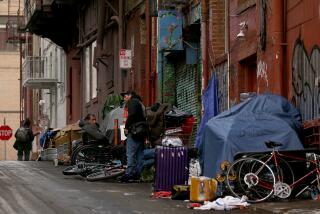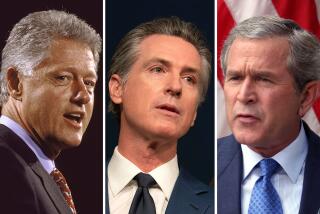Newsletter: Gov. Gavin Newsom’s sparse vetoes meant lawmakers got most of what they wanted
The California Legislature sent Gov. Gavin Newsom 1,042 bills this year, with more than 70% of them landing on his desk in the state Capitol around the time that lawmakers adjourned last month.
When the dust settled on Sunday, the legal deadline to act, Newsom had largely given legislators what they wanted. And in doing so, he continued a tradition set by his long-serving predecessor.
NEWSOM, LIKE BROWN, VETOES FEW BILLS
In fact, Newsom and former Gov. Jerry Brown both vetoed 16.5% of the bills ratified by the Legislature over the last few years. (To be clear, that was Brown’s highest veto percentage during his record-breaking 16 years in office.) Republican governors have said no to proposed laws more than Democrats, and Newsom’s veto rate was looking as if it would be quite low until he rejected 68 of the 80 bills left to consider in the final hours.
A spokesman for Newsom said the last batch of rejections mostly came down to money, proposals that would have boosted state government spending by $1.2 billion in their first year on the books, rising to a $3-billion annual price tag once fully implemented.
In many cases, Newsom wrote veto messages that lamented bills aimed at imposing rules on local government that would have been treated as a mandate that must be paid for with state tax revenues, a rationale used to reject measures such as language translation of documents related to special education and independent redistricting commissions to draw supervisorial districts in large counties.
By the way, while Brown holds the record for fewest vetoed bills and lowest veto percentage, which modern governors were the stingiest? The record for the most bills vetoed — 436 — belongs to the late Gov. George Deukmejian in 1990. The highest veto percentage was 35% of bills vetoed in 2008 by then-Gov. Arnold Schwarzenegger.
NEW STATE LAWS: LIGHTNING ROUND
-- California will become the first state in the nation to mandate later start times at most public schools under legislation signed into law on Sunday. The proposal was designed to improve educational outcomes by giving students more sleep.
-- Victims of childhood sexual abuse will have more time to report allegations and file a lawsuit under a law signed Sunday by Newsom.
-- Health insurance companies will have to cover the cost of fertility procedures for patients undergoing treatments that can make it difficult to have children, such as chemotherapy.
-- People caught using cigarettes, cigars, pipes or electronic cigarettes at California state beaches will face a fine of up to $25 under a bill signed by the governor and written by state Sen. Steve Glazer (D-Orinda), who cited the public risk of exposure to chemicals in tobacco smoke.
-- The state has now paved the way for parents in some school districts to bring medical cannabis to their students at K-12 campuses.
-- California will become the first state in the nation to require public universities to provide access to abortion pills on campus.
-- After a string of mass shootings across the country this year, Newsom toughened California’s already strict gun control laws, signing bills that broadly expand the state’s “red flag” law and limit the purchase of semiautomatic rifles by individuals to one per month.
-- New state laws will now give victims of sexual harassment more time to file complaints in California and ban forced arbitration as a condition of employment.
-- HIV prevention drugs will be available without a prescription in California under a new state law.
-- Californians will be able to register to vote on election day at polling places and voting centers, a potentially significant step toward boosting turnout in key contests next year.
-- Lawmakers have made it easier for homeowners to convert garages into residential space and build small free-standing homes, sometimes known as granny flats or casitas, in their backyards.
NOT THIS YEAR: THE VETO LIGHTNING ROUND
-- Senate Bill 42, vetoed on Saturday, would have required county jails to allow those being released to stay until daylight hours if they chose, and to provide a safe place to wait for a ride and to allow the released inmate to charge a mobile phone while waiting after business hours.
-- An effort to limit voter confusion in California by banning the use of the word “independent” in a political party’s name was vetoed, a proposal that would have forced one of the state’s lesser-known political parties to change its name.
-- Newsom vetoed a bill Sunday that would have brought new oversight of California’s dog blood industry that supplies veterinary hospitals with life-saving products for pets in the state, saying the proposal approved by lawmakers “does not go far enough.”
CATCHING UP ON THE LATEST TRUMP, CAMPAIGN NEWS
-- A video shown at a meeting of President Trump’s supporters depicted a likeness of the president shooting and stabbing his opponents in a church.
-- Trump’s order to remove U.S. troops from northern Syria followed a day of chaos and recriminations, with both Democratic and Republican critics accusing the president of abandoning an ally and opening the way for a resurgence of Islamic State militias.
-- The political cauldron of impeachment is an unlikely landing point for Ambassador Gordon Sondland, a wealthy hotelier little known outside the Northwest before becoming Trump’s liaison to the European Union.
-- Hunter Biden said Sunday that he will step down from the board of directors of a Chinese-backed private equity firm at the end of the month as part of a pledge not to work on behalf of any foreign-owned companies should his father, Joe Biden, win the presidency.
-- The elder Biden may be a huge target in the 2020 race, but nobody’s knocked him out yet.
-- The age and health of the top Democratic presidential candidates will come under scrutiny in Tuesday’s debate. Massachusetts Sen. Elizabeth Warren may be in her 70s, but she flaunts her fitness.
-- What time is the Democratic debate, and where can I watch it? A dozen candidates will crowd onstage in Ohio for the largest primary debate ever.
TODAY’S ESSENTIALS
-- Newsom ripped into the record of Pacific Gas & Electric Co. last week, calling the mass electricity outages “unacceptable” and the result of the utility’s own long legacy of mistakes.
-- After the shutoffs carried out to prevent wildfires, Newsom faces a much different power crisis from what upended a previous California governor, Gray Davis. But the PG&E outages still pose a political threat.
-- Companies must notify California residents of their data privacy rights in plain language and must verify people’s identities before releasing data, state Atty. Gen. Xavier Becerra proposed last week.
LOGISTICS
Essential Politics is written by Sacramento bureau chief John Myers on Mondays and Washington bureau chief David Lauter on Fridays.
You can keep up with breaking news on our politics page throughout the day. And are you following us on Twitter at @latimespolitics?
Miss Friday’s newsletter? Here you go.
Please send thoughts, concerns and news tips to politics@latimes.com.
Did someone forward you this? Sign up here to get Essential Politics in your inbox.
More to Read
Get the L.A. Times Politics newsletter
Deeply reported insights into legislation, politics and policy from Sacramento, Washington and beyond. In your inbox three times per week.
You may occasionally receive promotional content from the Los Angeles Times.







